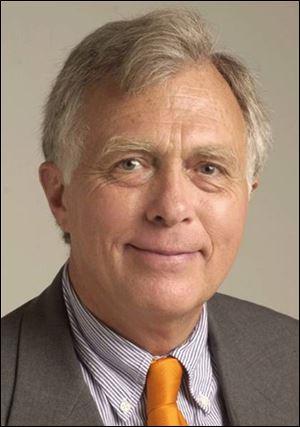
Christmas more complex than a figgy pudding
12/27/2006
Dan Simpson, a retired diplomat, is a member of the editorial boards of The Blade and Pittsburgh Post-Gazette.
CHRISTMAS in England sounds like a schoolgirl's diary from the 1940s. In 2006 the reality is much more complex.
Dinner Christmas Eve included turkey, stuffing, and cranberry sauce, but equally notable were the guests around the table: Bolivian, Dutch, Moldovian, Turkish, and American, as well as British. At a Velasquez exhibit at the National Gallery, my wife and I heard at least six languages being spoken.
The United Kingdom's European Union membership, plus its colonial and Commonwealth heritage, make it and especially London, its capital, among the most multicultural and polyglot spots on the Earth.
Thus, one of the usually subliminal but sometimes more open contests waged in the United Kingdom is between its traditions - the Yule log, figgy pudding, the carols, the Anglican faith, and the royal family as examples - and its new, constantly changing character. It may have always been thus. One famous story is about how a significant group of black Africans were brought to England in the 18th century, but by the time of a census had disappeared entirely, absorbed into the stock population.
But the assimilation/societal modification drama is more acute now than it has been in the past. It is exacerbated in part by the numbers involved as well as by the Muslim-Christian divide that is a prominent characteristic of British and American external relations with the world now, at a level unprecedented in centuries.
The Archbishop of Canterbury, Dr. Rowan Williams, the most senior clergyman in the state Church of England, put his finger on the problem in declarations he made during a pilgrimage to the Church of the Nativity and Manger Square in Bethlehem right before Christmas.
Mr. Williams ripped the British government, the American government, and Israel for poisoning relations between Muslims and Christians in the Middle East. Christians are actually being forced out of Iraq and Palestine in significant numbers. He called British Middle East policy short-sighted and ignorant.
The archbishop, who was accompanied to Bethlehem by high-ranking clergy of the British Catholic Church, Free Churches, and Armenian Church, also criticized the nine-yard-high Israeli wall and fence between Bethlehem and Jerusalem, saying it led to a destabilization of Palestinian society that did not favor the survival of Israel.
No American clergyman of comparable stature has challenged the Bush Administration so bluntly and directly as Mr. Williams attacked the government of British Prime Minister Tony Blair.
Mr. Blair is a particular political problem right now. He continues to seek to play the role of British "decider," traveling abroad, making proposals and consulting world leaders. At the same time, he has announced his early departure as prime minister, to be succeeded by current Chancellor of the Exchequer Gordon Brown, who will then lead the Labor Party into the next general elections.
As far as I could tell, the sole purpose that Mr. Blair serves now is as flak-catcher, assigned to soak up and be held responsible for as many as possible of the subjects of resentment that the British public feels against the Labor government after 10 years. The Labor scenario is that Mr. Blair absorbs the buckshot and flies away, leaving Mr. Brown able to disown at least some of Labor's failures.
Noteworthy among these is the Iraq war. Mr. Blair is seen as responsible for having stuck the United Kingdom in that disastrous affair, in pursuit of the vaunted U.K.-U.S. "special relationship." A prestigious British think tank, Chatham House, produced a study recently challenging Mr. Blair's government to show one single useful result for the United Kingdom achieved by Mr. Blair as a reward for its expensive posture in Iraq and Afghanistan.
On the other hand, at this point few think that Labor will lose the next elections, in spite of the Iraq war and other, largely domestic issues. These issues otherwise might cause the electorate to get rid of Mr. Blair's party in Parliament and at 10 Downing Street because, no matter how unsympathetic Mr. Brown sometimes appears to be, the Conservative and Liberal-Democrat leaders don't especially rise above lackluster either.
Another, always simmering drama among the British is the future of the royal family. The traditional Christmas speech of Queen Elizabeth II this year was a model of modernity. Garbed in a suit of fashionable parrot green, Her Majesty gave a televised speech interspersed with shots of her doing artwork with a multiracial group of children. The theme of the traditional address this year was bridging gaps between communities and generations.
The British are working hard on bridging gaps to Muslims in particular, far ahead of an ambivalent Bush Administration in that regard. Christmas dinner may have cost more in the United Kingdom than it would have in the United States. And almost no one goes to church. But the carols are everywhere and there is virtually no self-conscious political correctness about how the British celebrate Christmas.
For me, in spite of having spent a certain number of these holidays in the United Kingdom, there was no Dickensian resonance of Christmases past, present, or future. The British still know how to do Christmas with authority.
Dan Simpson, a retired diplomat, is a member of the editorial boards of The Blade and Pittsburgh Post-Gazette.